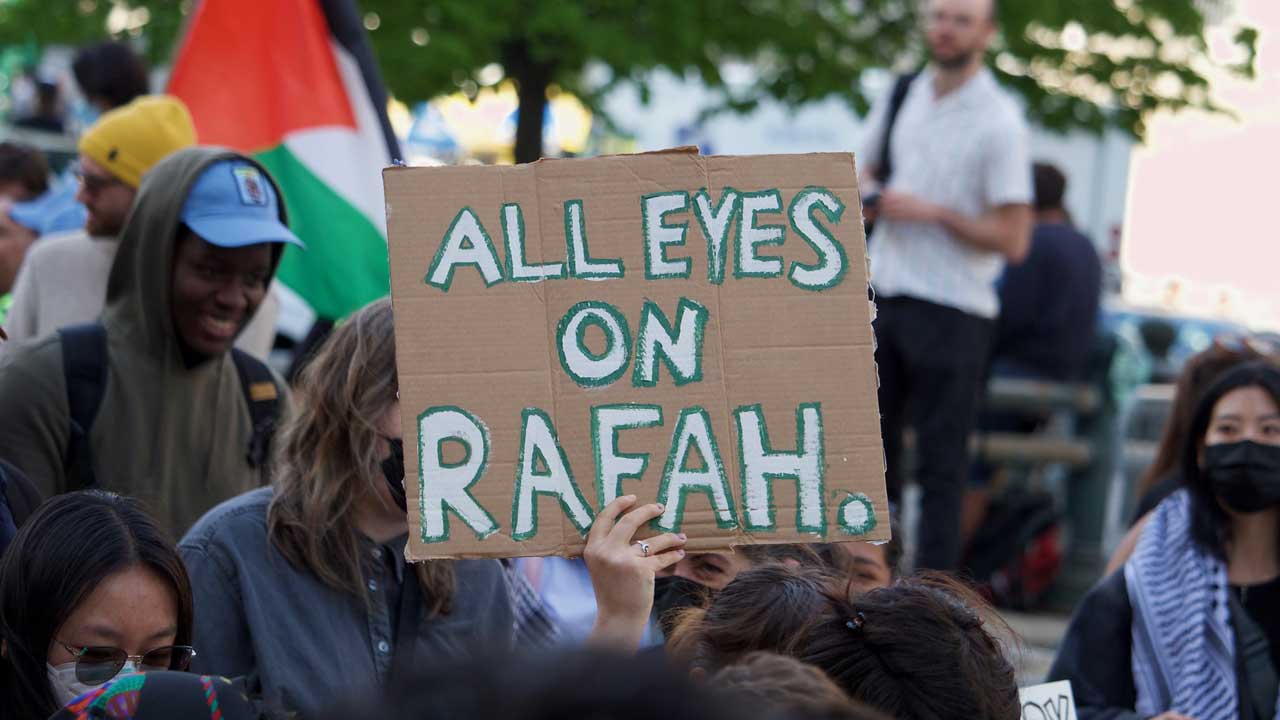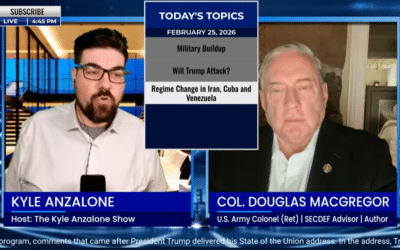The International Court of Justice (ICJ) today issued additional provisional measures in a case filed by the government of South Africa accusing the state of Israel of violating the 1948 Convention on the Prevention and Punishment of the Crime of Genocide, or the Genocide Convention.
The Court effectively ordered Israel to halt its military assault on Rafah in the Gaza Strip ongoing since May 7, to end its blockade and allow humanitarian goods into Gaza on the scale required to meet the needs of the population, and to allow unimpeded access to Gaza of international investigators.
The Court ordered Israel to “Immediately halt its military offensive, and any other action in the Rafah Governorate, which may inflict on the Palestinian group in Gaza conditions of life that could bring about its physical destruction in whole or in part;” to “Maintain open the Rafah crossing for unhindered provision at scale of urgently needed basic services and humanitarian assistance;” and to “Take effective measures to ensure the unimpeded access to the Gaza Strip of any commission of inquiry, fact-finding mission or other investigative body mandated by competent organs of the United Nations to investigate allegations of genocide”.
South Africa instituted proceedings against Israel for the crime of genocide on December 29, 2023. It submitted an 84-page application detailing the indiscriminate nature of Israel’s bombing in Gaza, its prevention of goods and services necessary for the survival of the population, and the openly genocidal intent of Israeli leaders. South Africa also requested the ICJ to issue provisional measures ordering Israel to cease its military operation in Gaza, dubbed “Operation Swords of Iron”.
In January, the Court hearings on the request for provisional measures. On January 11, 2024, South Africa presented its oral argument for why Israel’s actions constituted violations of its obligations under the Genocide Convention, urging the Court to issue preliminary measures ordering Israel to halt its operation on the grounds that it would be prejudicial to the rights of the Palestinians in Gaza to do nothing in the meantime while the Court deliberated for months or even years.
The Court did not have to wait to render a final judgment on the question of whether Israel is committing genocide, South Africa argued; it was sufficient for South Africa to have presented a plausible case that Israel was committing genocide to prompt the Court to act by issuing provisional measures.
South Africa explained that it was acting to comply with its own obligation under the Genocide Convention to take action to prevent the crime of genocide, as required of all parties to the treaty.
The crime of genocide itself is prohibited under international law not only for treaty signatories but as a peremptory norm (jus cogens), also known as customary international law, which may not be abrogated by any state on the grounds that they are not party to a treaty expressly prohibiting universally recognized crimes.
Israel presented its defense on January 12, preposterously denying any wrongdoing.
(Watch South Africa’s oral presentation here and Israel’s here.)
On January 23, the government of Nicaragua submitted an application to join South Africa in its case against Israel.
On January 26, the ICJ acceded to South Africa’s request and issued provisional measures on the grounds that Israel was committing a plausible genocide. While the Court did not explicitly order Israel to halt its military operation, it did order Israel to comply with its obligations under the Genocide Convention, including ceasing indiscriminate attacks on civilians and civilian infrastructure and allowing humanitarian aid into Gaza on the scale required to meet the population’s needs.
That amounted to an implicit order for Israel to halt its operation since as international human rights organizations and humanitarian agencies had been crying out for months that to deliver aid at the scale required would require a full cessation of hostilities.
(Watch the ICJ deliver its order in the case of South Africa v. Israel here.)
On February 12, after Israel had announced its intention to invade Rafah, the last area in Gaza where Israel had ordered civilians to flee and where they could get at least some access to humanitarian aid and medical care, South Africa submitted a request for additional provisional measures
On February 16, the Court issued its decision on that request, noting that “the most recent developments in the Gaza Strip, and in Rafah in particular, ‘would exponentially increase what is already a humanitarian nightmare with untold regional consequences’, as stated by the United Nations Secretary-General” on February 7. This situation, the Court said, did not require any additional measures but rather required Israel to implement the provisional measures ordered on January 26.
Thus, the Court effectively declared that Israel had failed to comply with its order to take steps to comply with its obligations under the Genocide Convention.
On March 6, South Africa submitted another request for additional provisional measures. Whereas on January 26 the ICJ had acknowledged the imminent risk of Palestinians starving to death, by March 6, Palestinian children had already been dying from hunger and malnutrition.
The ICJ issued its response on March 28, complying with South Africa’s request by reaffirming its order of January 26 and additionally ordering Israel, in light of “the spread of famine and starvation”, to take all necessary measures to ensure, without delay, the unhindered provision of “urgently needed basic services and humanitarian assistance, including food, water, electricity, fuel, shelter, clothing, hygiene and sanitation requirements, as well as medical supplies and medical care to Palestinians throughout Gaza, including by increasing the capacity and number of land crossing points and maintaining them open for as long as necessary”.
Thus, the Court once again effectively declared that Israel had failed to comply with its order of January 26, to which it added more specific requirements for Israel to facilitate the delivery of humanitarian aid.
On April 5, the government of Colombia filed an application to join South Africa in its case against Israel. The government of Libya followed with an application to join on May 10.
Also on May 10 South Africa once again requested additional provisional measures due to Israel’s brazen defiance of the Court’s previous orders. As South Africa noted,
Rafah is the last population centre in Gaza that has not been substantially destroyed by Israel and as such the last refuge for Palestinians in Gaza. Not only is there nowhere for the 1.5 million displaced people and others in Rafah safely to flee to — so much of Gaza having been reduced to rubble — if Rafah is similarly destroyed there will be little left of Gaza or of the prospects for the survival of Palestinian life in the territory.
Israel’s conduct had been “contemptuous of the Court and international law”, South Africa observed. “The onslaught on the Palestinians in Gaza is of a nature that can only be intended to result in the genocidal destruction of that group.”
South Africa therefore requested the Court to order Israel to immediately withdraw and cease its military operation in Rafah and to take all measures necessary to facilitate unimpeded access to Gaza of humanitarian aid as well as to allow access to journalists, UN officials, and international investigators.
The ICJ heard South Africa’s oral argument on May 16 and Israel’s response on May 17. Once again, Israel tried preposterously to maintain that it was doing everything possible to avoid harm to civilians and to facilitate the delivery of humanitarian aid into Gaza.
(Watch South Africa’s oral presentation here and Israel’s here.)
The ICJ’s response today once again acknowledged the legitimacy of South Africa’s argument by acceding to the request to order Israel to immediately cease its military operation in Gaza.
(Watch the ICJ issue its order here.)
On May 20, the Prosecutor of the International Criminal Court (ICC), a separate body in the Hague, Netherlands, requested arrest warrants for three top Hamas officials for the Hamas-led attacks in Israel on October 7, 2023, which prompted Israel’s military assault on the civilian population of Gaza, as well as for Israeli Prime Minister Benjamin Netanyahu and Israeli Defense Minister Yoav Gallant, all of whom are charged with war crimes and crimes against humanity.
Israel’s genocide in Gaza has been facilitated by the support of the US government under the Biden administration, officials of which could similarly be prosecuted by the ICC for complicity in Israel’s genocide.
Originally published at JeremyRHammond.com.































![The Kyle Anzalone Show [GUEST] Dave DeCamp: BREAKING: Tucker Carlson detained in ISRAEL! – Trump’s Iran Strategy Exposed!](https://offload-wp-files.sfo3.digitaloceanspaces.com/2026/02/Screenshot-2026-02-27-115531-400x250.png)
